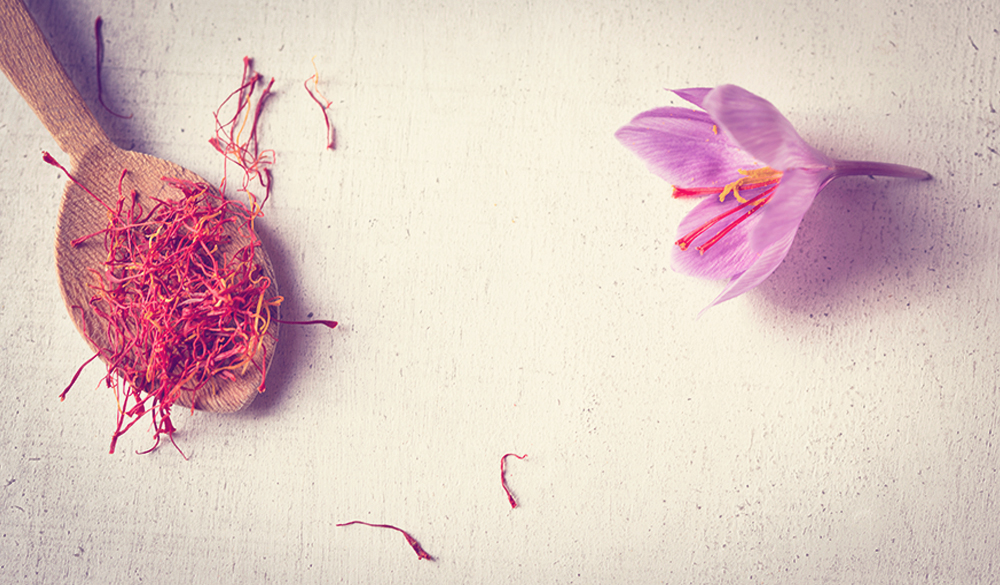Considered one of the worlds most expensive and exotic spices, saffron (Crocus sativus L. stigma) is used both as a colouring and flavouring agent. Saffron is also known to have many health benefits going back as far as the writings of Galen and Hippocrates.[1-5]
Derived from the Arab word for yellow, the name saffron reflects the high concentration of carotenoid pigments present in the stigmas of the saffron flowers.[6,7]
Saffron contains more than 150 volatile and aroma-yielding compounds. The three main components of saffron responsible for its pharmacological effects are:[2,3,6-9]
- a natural carotenoid crocin and its derivative crocetin are responsible for the golden-yellow hue of saffron
- the glycoside picrocrocin, a precursor of safranal, is responsible for the bitter taste
- safranal, the deglycosylated form of picrocrocin, is responsible for the characteristic aroma of saffron.
Conditions and evidence-based dosages
Saffron has been considered a potential therapeutic or preventive agent for a number of health conditions including cancer, cardiovascular disease and depression.[10-12] Additionally saffron has proved to have a favourable safety profile and is well tolerated.[13,14]
Modern pharmacological studies have demonstrated that saffron and its constituents, particularly crocin and safranal, have a wide spectrum of activities:[3,5,10,12]
- Antioxidant: saffron may provide increased protection against a variety of reactive oxygen species and pro-inflammatory cytokines
- Antidepressant and anxiolytic
- Antinociceptive and anti-inflammatory
- Memory enhancer
- Improves male erectile dysfunction
- Hypotensive
- Anti-tumor
- Anti-diabetic
- Anti-atherosclerotic
Macular health
Both oxidative stress and chronic inflammation play a significant role in the pathogenesis of age-related macular degeneration (ARMD).
In addition to its antioxidant and anti-inflammatory properties saffron may protect photoreceptors from retinal stress, maintaining both morphology and function and possibly acting as a regulator of programmed cell death.[15,16]
The neuroprotective effects of saffron have been demonstrated in patients with early ARMD. Patients received oral saffron (20mg/day) or placebo over a three-month period. Results showed that short-term saffron supplementation significantly improves retinal flicker sensitivity in early ARMD.[15]
In a similar study, early ARMD patients with a baseline visual acuity >0.3 were given oral saffron (20mg/day) over 14(±2) months. After three months of supplementation, mean focal electroretinograms (fERG) sensitivity and mean visual acuity improved. These changes also remained stable over the follow-up period.[16]
These results suggest that saffron supplementation in early ARMD induces macular function improvements from baseline that are extended over a long-term follow-up. It is currently unknown whether saffron supplementation may exert a beneficial protective effect in patients with more advanced stages of the disease.
Mental health
The beneficial effects of saffron in the management of neurological abnormalities, particularly depressive disorders and Alzheimer’s disease have been shown in various studies.[17]
Known psychopharmacological actions of saffron include:[18,19]
- Inhibition of monoamine re-uptake (e.g. serotonin, dopamine and noradrenaline)
- Enhanced binding and sensitisation of serotonin receptors
- Monoamine oxidase inhibition
- Neuro-endocrine modulation
Other lesser known effects include:[18]
- GABAergic effects
- Cytokine modulation (especially in depressive disorders with a comorbid inflammatory condition)
- Opioid and cannabinoid system effects
The mood elevating and anxiolytic properties of saffron may be due to the modulation of neurological pathways that have both antidepressant and anxiolytic effects, e.g. GABA, serotonin, and noradrenaline systems.[18]
Saffron extract has been studied in trials in comparison to placebo and/or antidepressant drugs. Results indicate saffron as an effective antidepressant drug and this provides initial support for the use of saffron for the treatment of mild to moderate depression.[20]
In a randomised, double-blind study, 30mg of saffron extract was given to patients who met DSMV IV for major depression for 6 weeks. This resulted in significant alleviation of depression compared to those on placebo, and did so without evident side effects.[8]
Saffron's antidepressant effects are potentially due to its antioxidant, anti-inflammatory, neuroendocrine and neuroprotective effects. Specifically, saffron may modulate levels of certain neurotransmitters in the brain, including serotonin, by inhibiting serotonin reuptake thereby keeping serotonin in the synaptic cleft longer.[21,22]
Saffron supplementation may also improve symptoms of depression in adults with major depressive disorder (MDD). Saffron was found to be more effective than placebo and have effects similar to imipramine and fluoxetine in the treatment of MDD.[10,22]
The efficacy of crocin, as an adjunctive treatment in MDD, was studied in a pilot clinical trial. The crocin group was given one selective serotonin reuptake inhibitor (SSRI) drug (fluoxetine, sertraline or citalopram) plus crocin tablets (30mg/day) and the placebo group were administered one SSRI drug plus placebo. The crocin group showed significantly improved scores on beck depression inventory (BDI), beck anxiety inventory (BAI) and general health questionnaire (GHQ) compared to the placebo group.[23]
Alzheimer’s disease (AD)
Saffron may inhibit the aggregation and deposition of amyloid β in the human brain and may therefore be useful in the management of AD.[20,24]
Clinical trials on the anti-Alzheimer effect of saffron demonstrated that it was more effective than placebo and as effective as donepezil.[20]
Forty-six patients with probable AD were screened for a 16-week study of parallel groups of patients with mild to moderate AD. Patients either received saffron 30mg/day or placebo. After 16 weeks, saffron produced a significantly better outcome on cognitive function than placebo. This study suggests that at least in the short-term, saffron is both safe and effective in mild to moderate AD.[24]
The efficacy and safety of saffron extract versus memantine in reducing cognitive deterioration in moderate to severe AD has also been compared. Patients received memantine (20mg/day) or saffron extract (30mg/day) for 1 year. At the end of the study administration of saffron showed to be comparable with memantine in reducing cognitive decline in patients with moderate to severe AD.[25]
Sexual health
The safety and efficacy of saffron has been evaluated on SSRI-induced sexual dysfunction in both men and women.
Thirty-six male patients with MDD, stabilised on fluoxetine and with subjective complaints of sexual impairment, were randomly assigned to saffron (15mg twice per day) or placebo for 4 weeks. By week 4, saffron resulted in significantly greater improvement in erectile function and intercourse satisfaction domains and total scores than the placebo group. At the end of the study nine patients (60%) in the saffron group and one patient (7%) in the placebo group achieved normal erectile function. Overall saffron was found to be a tolerable and efficacious treatment for fluoxetine-related erectile dysfunction.[26]
Thirty-eight women with major depression, stabilised on fluoxetine 40mg/day for a minimum of 6 weeks and experiencing subjective feelings of sexual dysfunction either received saffron (30mg/day) or placebo for 4 weeks. At the end of the study, patients in the saffron group had experienced significantly more improvement in total Female Sexual Function Index (FSFI). It appears that saffron may safely and effectively improve some of the fluoxetine-induced sexual problems including arousal, lubrication and pain.[27]
Weight loss
Saffron may produce a satiating effect, reducing the tendency to snack and hence may assist weight loss. The effects of saffron supplementation on snacking behaviours and weight loss were determined in an 8-week study. Results showed that healthy, mildly overweight women (mean BMI = 26.8) who took saffron for 8 weeks lost significantly more weight and had a reduction in snacking compared to placebo. Specifically, snacking decreased by 55% in the saffron group as compared to 28% in the placebo group.[10,28]
References
- HerbWisdom.com. Saffron (Crocus sativus). RFI Media 2015. [Source]
- Rahaiee S, Moini S, Hashemi M, et al. Evaluation of antioxidant activities of bioactive compounds and various extracts obtained from saffron (Crocus sativus L.): a review. J Food Sci Technol 2015;52(4):1881-1888. [Full text]
- Razavi BM, Hosseinzadeh H. Saffron as an antidote or a protective agent against natural or chemical toxicities. Daru 2015;23:31. [Full text]
- Food Facts. What is saffron good for? Mercola.com [Source]
- Christodoulou E, Kadoglou NP, Kostomitsopoulos N, et al. Saffron: a natural product with potential pharmaceutical applications. J Pharm Pharmacol 2015;67(2):1634-1649. [Abstract]
- Samarghandian S, Borji A. Anticarcinogenic effect of saffron (Crocus sativus L.) and its ingredients. Pharmacognosy Res 2014;6(2):99-107. [Full text]
- Rudrappa U. Saffron nutrition facts. www.nutrition-and-you.com 2015. [Source]
- Moshiri E, Basti AA, Noorbala AA, et al. Crocus sativus L. (petal) in the treatment of mild-to-moderate depression: a double-blind, randomized and placebo-controlled trial. Phytomedicine 2006;13(9-10):607-611. [Abstract]
- Alavizadeh SH, Hosseinzadeh H. Bioactivity assessment and toxicity of crocin: a comprehensive review. Food Chem Toxicol 2014;64:65-80. [Abstract]
- Hausenblas HA, Heekin K, Mutchie HL, et al. A systematic review of randomized controlled trials examining the effectiveness of saffron (Crocus sativus L.) on psychological and behavioral outcomes. J Integr Med 2015;13(4):231-240. [Full text]
- Schmidt M, Betti G, Hensel A. Saffron in phytotherapy: pharmacology and clinical uses. Wien Med Wochenschr 2007;157(13-14):315-319. [Abstract]
- Broadhead GK, Chang A, Grigg J, et al. Efficacy and safety of saffron supplementation: current clinical findings. Crit Rev Food Sci Nutr 2016;56(16):2767-2776. [Abstract]
- Akhondzadeh S, Tahmacebi-Pour N, Noorbala AA, et al. Crocus sativus L. in the treatment of mild to moderate depression: a double-blind, randomized and placebo-controlled trial. Phytother Res 2005;19(2):148-151. [Abstract]
- Akhondzadeh S, Fallah-Pour H, Afkham K et al. Comparison of Crocus sativus L. and imipramine in the treatment of mild to moderate depression: a pilot double-blind randomized trial. BMC Complement Altern Med 2004;4:12. [Full text]
- Bisti S, Maccarone R, Falsini B. Saffron and retina: neuroprotection and pharmacokinetics. Vis Neurosci 2014;31(4-5):355-361. [Abstract]
- Piccardi M, Marangoni D, Minnella AM, et al. A longitudinal follow-up study of saffron supplementation in early age-related macular degeneration: sustained benefits to central retinal function. Evid Based Complement Alternat Med 2012;2012:429124. [Full text]
- Singh D. Neuropharmacological aspects of Crocus sativus L.: a review of preclinical studies and ongoing clinical research. CNS Neurol Disord Drug Targets 2015;14(7):880-902. [Abstract]
- Sarris J, Panossian A, Schweitzer I, et al. Herbal medicine for depression, anxiety and insomnia: a review of psychopharmacology and clinical evidence. Eur Neuropsychopharmacol 2011;21(12):841-860. [Abstract]
- De Monte C, Carradori S, Chimenti P, et al. New insights into the biological properties of Crocus sativus L.: chemical modifications, human monoamine oxidases inhibition and molecular modeling studies. Eur J Med Chem 2014;82:164-171. [Abstract]
- Moshiri M, Vahabzadeh M, Hosseinzadeh H. Clinical applications of saffron (Crocus sativus) and its constituents: a review. Drug Res (Stuttg) 2015;65(6):287-295. [Abstract]
- Lopresti AL, Drummond PD. Saffron (Crocus sativus) for depression: a systematic review of clinical studies and examination of underlying antidepressant mechanisms of action. Hum Psychopharmacol 2014;29(6):517-527. [Abstract]
- Hausenblas HA, Saha D, Dubyak PJ, et al. Saffron (Crocus sativus L.) and major depressive disorder: a meta-analysis of randomized clinical trials. J Integr Med 2013;11(6):377-383. [Full text]
- Talaei A, Hassanpour Moghadam M, Sajadi Tabassi SA, et al. Crocin, the main active saffron constituent, as an adjunctive treatment in major depressive disorder: a randomized, double-blind, placebo-controlled, pilot clinical trial. J Affect Disord 2015;174:51-56. [Abstract]
- Akhondzadeh S, Sabet MS, Harirchian MH, et al. Saffron in the treatment of patients with mild to moderate Alzheimer's disease: a 16-week, randomized and placebo-controlled trial. J Clin Pharm Ther 2010;35(5):581-588. [Abstract]
- Farokhnia M, Shafiee Sabet M, Iranpour N, et al. Comparing the efficacy and safety of Crocus sativus L. with memantine in patients with moderate to severe Alzheimer's disease: a double-blind randomized clinical trial. Hum Psychopharmacol 2014;29(4):351-359. [Abstract]
- Modabbernia A, Sohrabi H, Nasehi AA, et al. Effect of saffron on fluoxetine-induced sexual impairment in men: randomized double-blind placebo-controlled trial. Psychopharmacology (Berl) 2012;223(4):381-388. [Abstract]
- Kashani L, Raisi F, Saroukhani S et al. Saffron for treatment of fluoxetine-induced sexual dysfunction in women: randomized double-blind placebo-controlled study. Hum Psychopharmacol 2013;28(1):54-60. [Abstract]
- Gout B, Bourges C, Paineau-Dubreuil S. Satiereal, a Crocus sativus L extract, reduces snacking and increases satiety in a randomized placebo-controlled study of mildly overweight, healthy women. Nutr Res 2010;30(5):305-313. [Abstract]
DISCLAIMER:
The information provided on FX Medicine is for educational and informational purposes only. The information provided on this site is not, nor is it intended to be, a substitute for professional advice or care. Please seek the advice of a qualified health care professional in the event something you have read here raises questions or concerns regarding your health.



